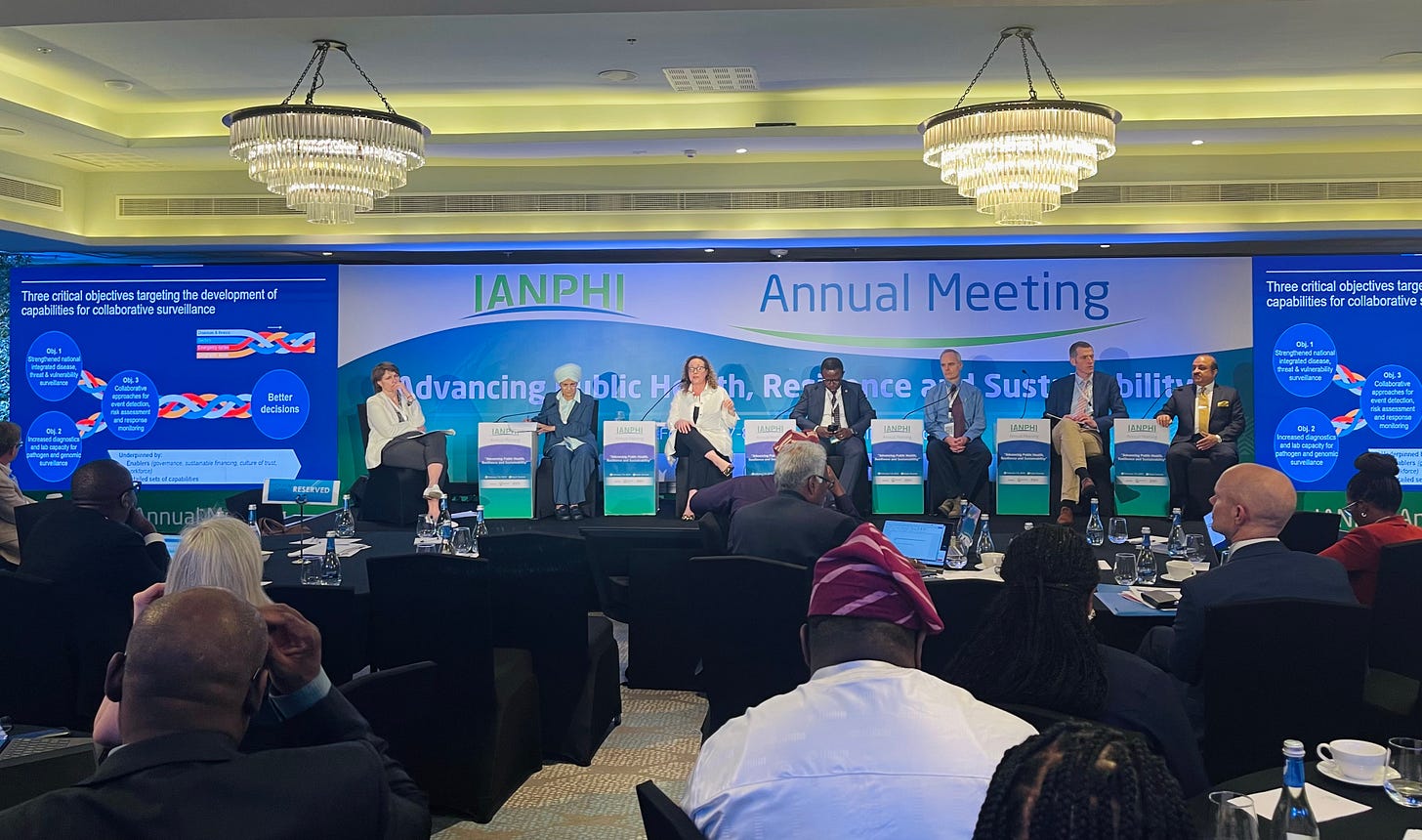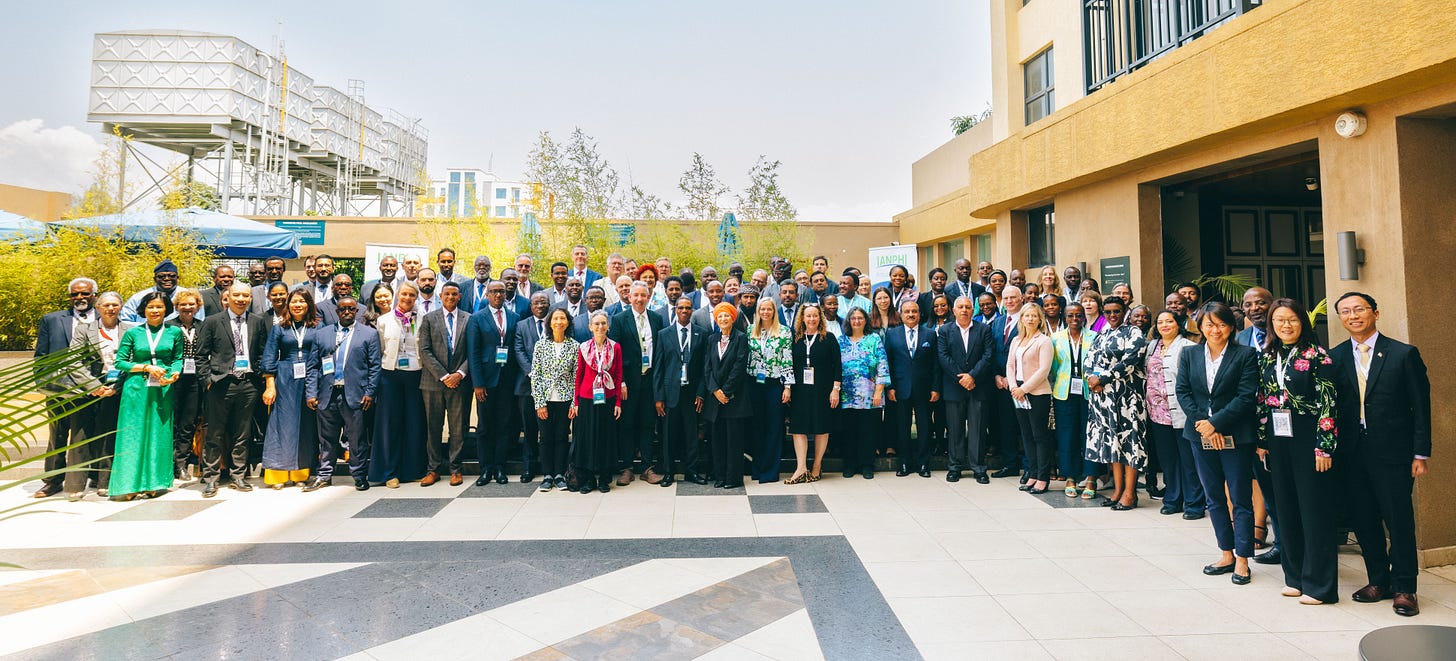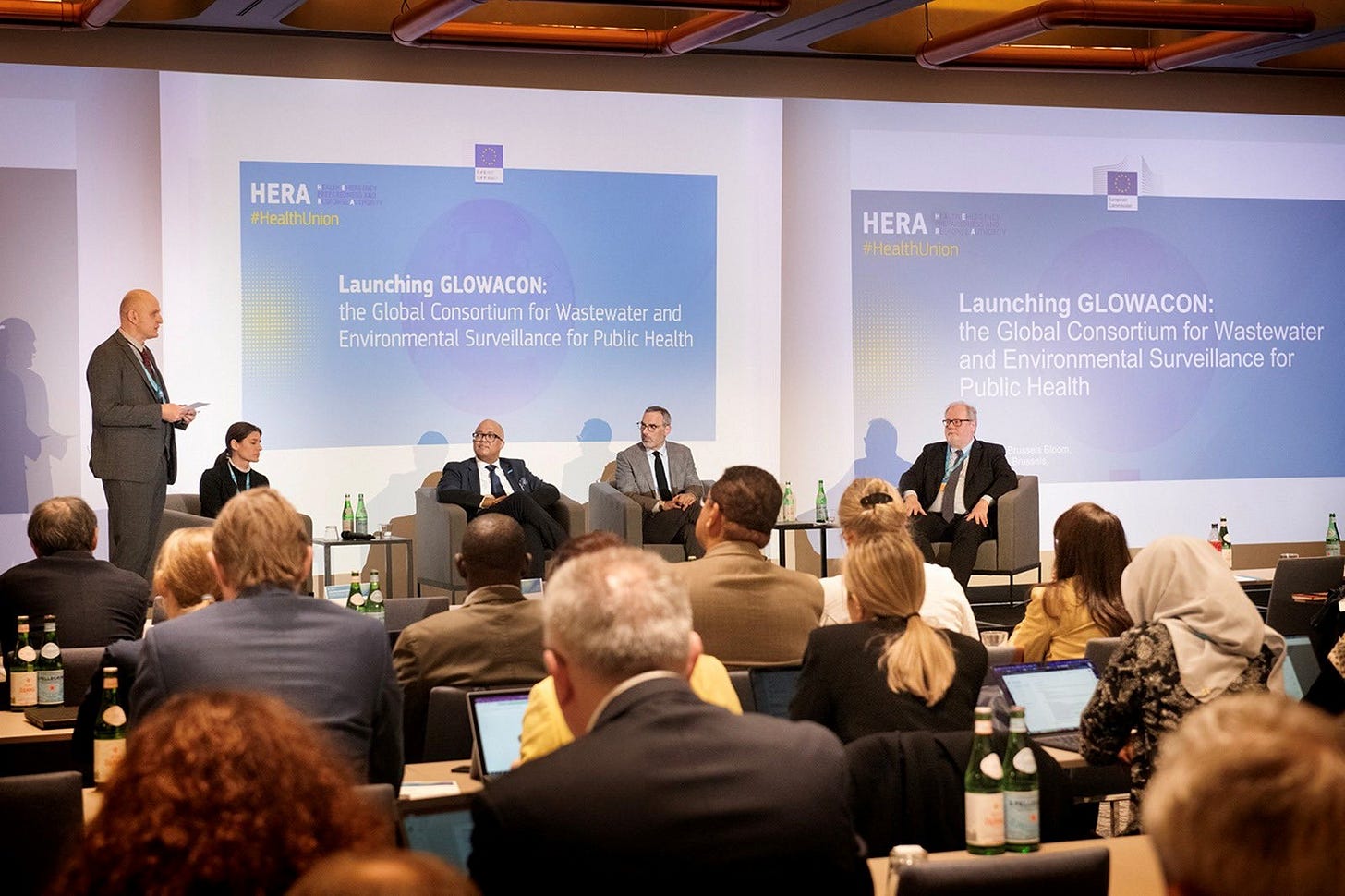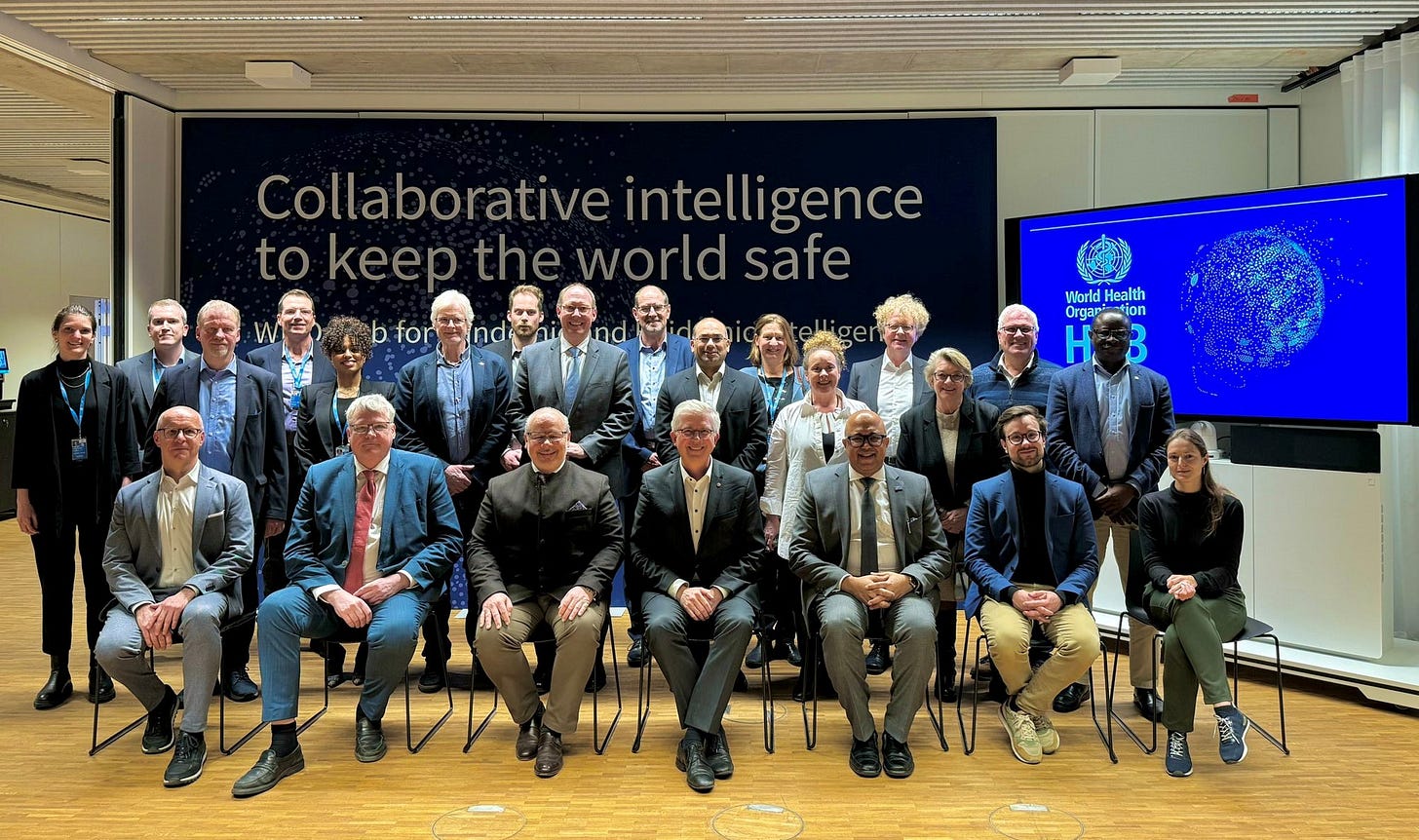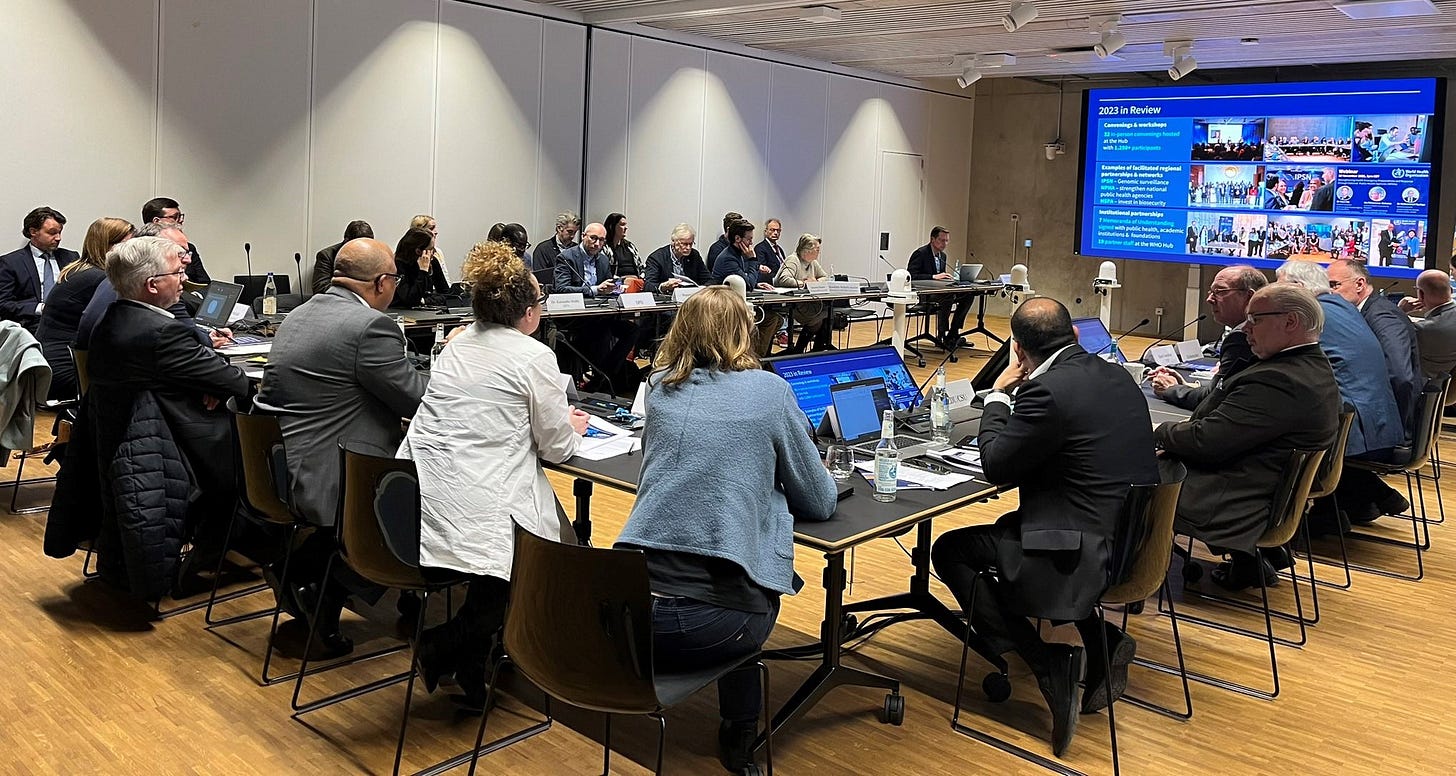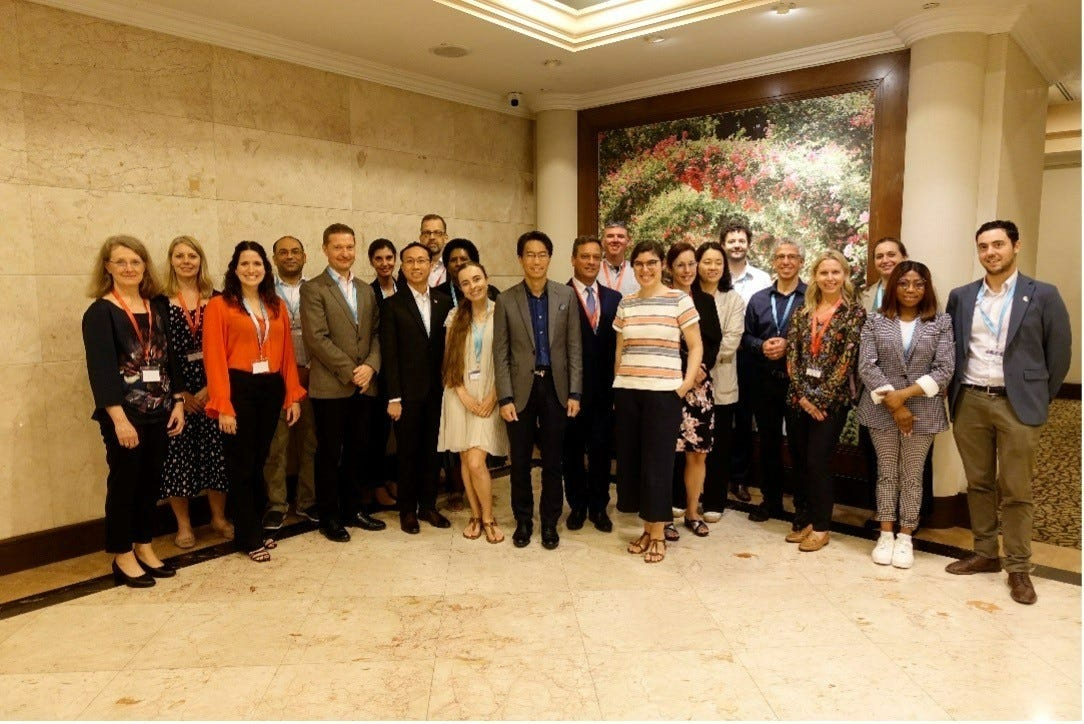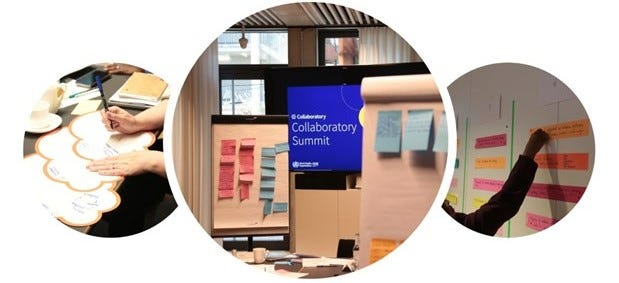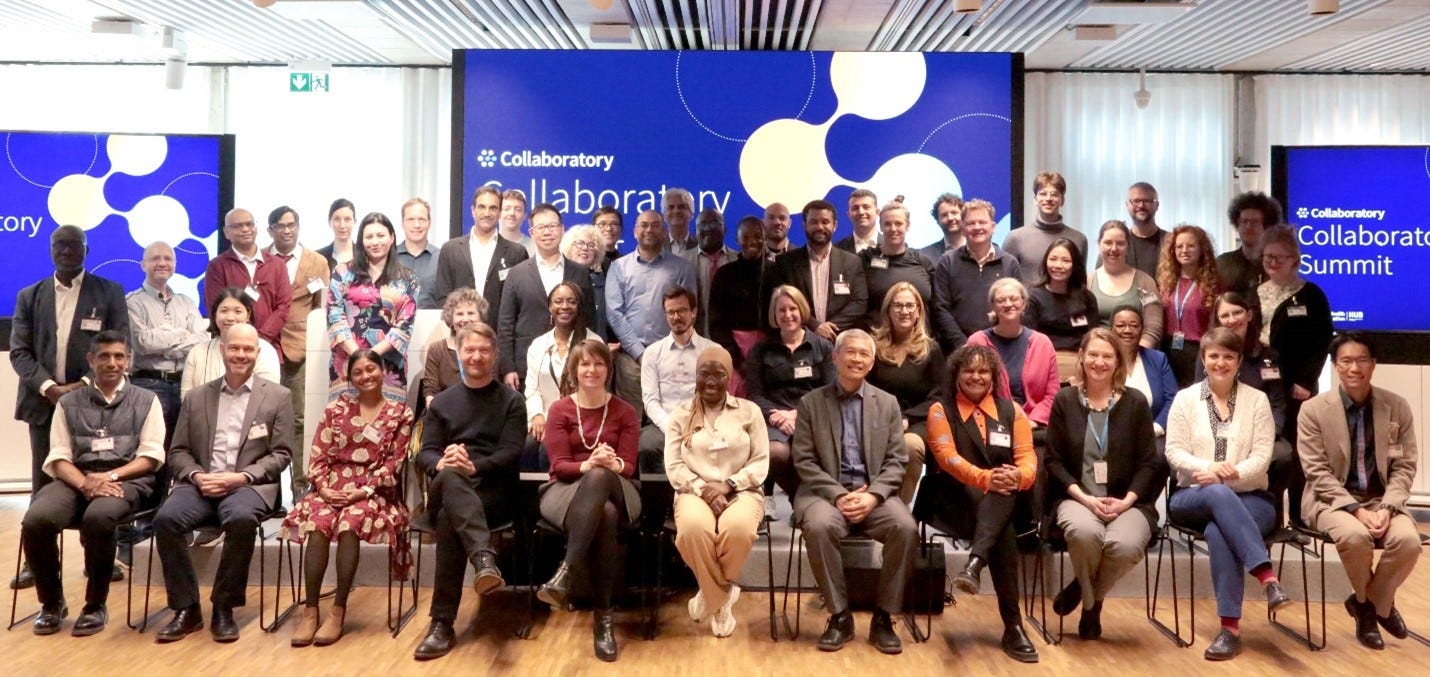The first quarter of 2024 marked an exciting start to the year for the WHO Hub for Pandemic and Epidemic Intelligence.
Transitioning Collaborative Surveillance from a concept to global implementation remains a priority for us. We have been accelerating our initiatives, strengthening partnerships, building communities, as well as taking stock of good practices and lessons learned along the way.
We are pleased to share with you a selection of these highlights:
Launching the catalytic grant fund for pathogen genomics by the International Pathogen Surveillance Network
Building core capabilities of national public health agencies for health emergency preparedness and response
Leveraging global momentum on wastewater and environmental surveillance for stronger public health surveillance
Visit of the German Parliamentary Sub-Committee on Global Health
Strengthening surveillance and health security systems in Africa through a unique partnership model
EIOS Coordination Group's mid-term meeting in Singapore shapes future strategy
The Collaboratory Summit
Enhancing global preparedness and response capacity for respiratory pathogens in Tanzania
Strengthening public health intelligence training globally
Speaker Series N°7 - A laboratory for collaboration: Leveraging diversity for better decision-making
9th Innovation Forum: Bridging climate and health data for decision-making
Read on for more details!
GLOBAL ENGAGEMENT AND PRIORITY SETTING
Launching the catalytic grant fund for pathogen genomics by the International Pathogen Surveillance Network
On 23 February 2024, the World Health Organization (WHO) announced US$ 4 million in funding from donors to create a catalytic grant fund for organisations working in pathogen genomic surveillance. The fund will support pilot projects across the world, particularly in low- and middle-income countries, to create an evidence base for how to scale up pathogen genomic surveillance. The results of this kind of surveillance help countries and the world to respond more quickly and effectively to prevent outbreaks and to respond to them.
The initial grants for the catalytic fund have been provided by the Bill & Melinda Gates Foundation, the Rockefeller Foundation and Wellcome, to support the International Pathogen Surveillance Network (IPSN). The IPSN is a new global network of pathogen surveillance actors convened by WHO through a Secretariat at the WHO Hub for Pandemic and Epidemic Intelligence. The fund is hosted by the UN Foundation on behalf of the IPSN.
More details on the IPSN catalytic grant fund can be found here.
Building core capabilities of national public health agencies for health emergency preparedness and response
On 7–8 February 2024, the WHO Hub participated in the International Association of National Public Health Institutes (IANPHI) Annual Meeting in Kigali, Rwanda. Sara Hersey, Director of Collaborative Intelligence at the WHO Hub, spoke on strengthening collaboration in surveillance and response. She highlighted the Collaborative Surveillance approach and introduced emerging communities working to improve public health intelligence and evidence for decision-making.
© WHO
On the sidelines of the IANPHI Annual Meeting, the WHO Hub on behalf of the WHO Health Emergencies Programme convened a consultation with approximately 60 national public health agencies (NPHAs) and partners on the core capabilities of NPHAs for health emergency preparedness and response. The consultation was co-organised with IANPHI, the Robert Koch Institute (RKI), and the Rwanda Biomedical Centre. As part of an on-going consultation process to develop a Framework for Core Capabilities of NPHAs for Emergency Preparedness and Response, the feedback from this consultation is being incorporated into the framework development process and will inform upcoming regional consultations in collaboration with WHO regional offices and partners.
© IANPHI
Leveraging global momentum on wastewater and environmental surveillance for stronger public health surveillance
The Global Wastewater and Environmental Surveillance (WES) Consortium (GLOWACON) was launched on 19-20 March in Brussels. The aim is to enhance collaboration among different stakeholders, stimulate innovation, prioritisation, and standardisation in the field of WES and secure its integration into a collaborative public health surveillance landscape.
Dr Chikwe Ihekweazu, Assistant Director-General of WHO’s Division of Health Emergency Intelligence and Surveillance Systems, spoke at the launch of the GLOWACON hosted by the European Commission Health Emergency Preparedness and Response Authority. WHO, with partners and Member States, will work to identify the settings in which WES is effective to guide countries in WES implementation and integration in their surveillance systems, through a Collaborative Surveillance approach. In addition, WHO will define the norms and standards for data collection and sharing for stronger public health surveillance.
© WHO
Strengthening public health intelligence training globally
On 1 February 2024, the public health intelligence (PHI) training working group convened in Singapore. The working group comprises experts in PHI training, including representatives from RKI, Africa Centres for Disease Control and Prevention (Africa CDC), the Food and Agriculture Organization of the United Nations, European Centre for Disease Prevention and Control (ECDC), US Centers for Disease Control and Prevention (US CDC), Ministry of Health of Brazil, Public Health Agency of Canada, the WHO Hub for Pandemic and Epidemic Intelligence, and the Public Health Intelligence Unit at WHO headquarters. This working group was convened under the joint leadership of the US CDC and RKI.
The meeting focused on the ongoing efforts to define and develop a new PHI competency framework and PHI curriculum, establish a PHI trainers’ network, and create a database of PHI training materials. Concrete next steps include launching the PHI competency framework and curriculum, developing indicators for select competencies, and exploring strategies to effectively position the working group with relevant stakeholders. This collective effort underscores the commitment of global stakeholders to enhance and standardise PHI training, empowering public health professionals worldwide to effectively respond to emerging health threats and safeguard global health security.
© WHO
COUNTRY AND REGIONAL PERSPECTIVES
Visit of the German Parliamentary Sub-Committee on Global Health
On 11 March 2024, the WHO Hub for Pandemic and Epidemic Intelligence hosted the German Parliamentary Sub-Committee on Global Health for a discussion on strengthening pandemic and epidemic intelligence and preparedness. The presence of 13 Members of the Parliament underscored Germany's continued commitment to multilateralism in addressing global health challenges.
© WHO
The conversation centred on the implementation of Collaborative Surveillance, one of WHO’s key strategies to strengthen the global architecture for health emergency prevention, preparedness and response (HEPR). A selection of Hub-led projects and initiatives were introduced, including the International Pathogen Surveillance Network (IPSN), the Epidemic Intelligence from Open Sources Initiative (EIOS), and efforts to strengthen National Public Health Agencies (NPHA). Afterwards, the Subcommittee resumed its regular session on “Digital Health Governance” from the WHO Hub.
© WHO
The WHO Hub has been founded with the support of the German government. The WHO Hub is committed to strengthening its collaboration with the German global health ecosystem, recognising the significant role of such partnerships in advancing our collective efforts toward global health security.
Enhancing global preparedness and response capacity for respiratory pathogens in Tanzania
On 26-27 February 2024, the WHO Hub, in collaboration with the WHO Global Influenza Programme, WHO Regional Office for Africa (AFRO), WHO Country Office in Tanzania, and national authorities in the United Republic of Tanzania, convened a two-day workshop in Dar es Salaam to enhance the detection and response to influenza and other respiratory pathogens.
Focusing on strengthening Collaborative Surveillance for respiratory pathogens by enhancing sentinel surveillance and public health intelligence, the workshop brought together more than 30 participants from various sectors, including the Ministry of Health, the Office of the Prime Minister, the Ministry of Health in Zanzibar, sentinel surveillance sites, and partner organisations such as the US CDC.
© WHO
This workshop is part of a larger collaboration with the WHO Global Influenza Programme, WHO AFRO, and the US CDC, which aims to enhance global preparedness and response capacity for infectious respiratory diseases through the Global Influenza Surveillance and Response System (GISRS) and public health intelligence, including the Epidemic Intelligence from Open Sources (EIOS) initiative. Similar national workshops are planned in Togo and South Africa for April 2024.
This workshop underscored Tanzania's dedication to strengthening its capacity to detect and respond to respiratory diseases, enhancing Collaborative Surveillance activities, and aligning with global efforts to enhance global health security. The collaboration between national and global partners also exemplifies the collective commitment to safeguarding public health in Tanzania, the African region, and beyond.
© WHO
EIOS Coordination Group's mid-term meeting in Singapore shapes future strategy
The Epidemic Intelligence from Open Sources (EIOS) initiative’s Coordination Group convened in Singapore 30-31 January 2024 for its face-to-face mid-term meeting. The meeting was co-organised with the Singapore Ministry of Health.
The group, comprised of 12 Member States and organisations, including WHO, is the governing body of the EIOS initiative and provides strategic recommendations and advice to the initiative. During the meeting in Singapore, members collectively reflected on the initiative's achievements to date and provided suggestions for the newly drafted strategy for EIOS implementation over the coming three to six years, with a particular focus on sustainable expansion.
As of March 2024, more than 110 user communities are represented on the EIOS system as part of the global initiative, including 88 WHO Member States. The Dominican Republic, El Salvador and the Netherlands are the most recent members to have joined the EIOS community of practice since the beginning of the year.
©WHO/Singapore MoH
Strengthening surveillance and health security systems in Africa through a unique partnership model
The Health Security Partnership to Strengthen Disease Surveillance and Epidemic Intelligence in Africa (HSPA) is a joint initiative by WHO, Africa CDC, and RKI to strengthen disease surveillance capabilities across Africa. Coordinated by the WHO Hub, the HSPA is funded by the Government of Canada and aligned with the health security objectives of the G7-led Global Partnership Against the Spread of Weapons of Mass Destruction.
On 28-29 February 2024, WHO Regional Office for Africa (AFRO) on behalf of the partnership convened a technical progress review meeting in the Republic of Congo to take stock of progress made, accelerate implementation, and plan for the future. Representatives from the six partner countries - The Gambia, Mali, Morocco, Namibia, South Africa, and Tunisia – plus institutional partners from WHO, Africa CDC, and RKI, as well as the initiative’s funder, Global Affairs Canada, attended the meeting. Key priorities for the remaining six months of the present phase were identified, and inputs were collected to start shaping the next phase of the initiative. The HSPA has demonstrated a unique model for strengthening cross-collaboration among Member States and partners and has been pivotal in coordinating high-level engagements for sustainable capacity strengthening across countries.
©WHO
The HSPA has also been featured as one of the signature initiatives to strengthen surveillance and health security systems in Africa by Africa CDC. From 19-21 March 2024, the WHO Hub joined other partners in the Health Security Governance meeting in Addis Ababa organised by Africa CDC under the umbrella of the HSPA. Bringing together decision-makers, technical experts, as well as partners at global, regional and country levels, the meeting discussed country policy proposals, mapped out strategies for long-term sustainability, and fostered political commitment to and investments in epidemic intelligence, surveillance and biosecurity across Africa.
© Africa CDC
COLLABORATIVE SURVEILLANCE IN ACTION
The Collaboratory Summit
On 19-21 March 2024, the WHO Hub hosted the Collaboratory Summit in Berlin. The Collaboratory is an initiative of the WHO and is establishing a digital environment that connects the pandemic and epidemic intelligence community to collaboratively respond to outbreaks with improved data, enhanced analysis and actionable insights.
© WHO
The Summit brought together approximately 50 experts from around the world including the Collaboratory technical advisory group, WHO regional and HQ experts and Collaboratory partners, with the aim of creating a roadmap that ensures alignment with the pandemic and epidemic intelligence priorities of countries and regions alike.
The Summit included interactive workshop sessions to draw out collective analytical priorities, align and strengthen analytics networks and advise on strategic direction for the Collaboratory. The Summit also advanced discussions on intelligence communities and a digital environment that convenes these communities to support collaborative analysis, connection and sharing of lessons learned. Bringing such experts together allows technical input into the Collaboratory while building trust and connection within the community.
To learn more about the Collaboratory visit our website: Collaboratory (who.int)
© WHO
Speaker Series N°7 - A laboratory for collaboration: Leveraging diversity for better decision-making
On 21 March 2024, the WHO Hub hosted its seventh Speaker Series session exploring how to leverage diversity in pandemic and epidemic intelligence to support better public health decision-making. The session was under a new theme of “Protecting the World: Moving Rapidly Together” and was co-hosted with the Charité Center for Global Health.
Advocating for more diversity in public health intelligence, the session brought together speakers with extensive experience in advancing diversity for better public health decision-making. Specifically, the session highlighted the socio-technical nature of decision-making in public health; emphasised the importance of sex and gender as strong determinants; and advocated for recognising the needs and knowledge of marginalised groups to ensure culturally appropriate and community-led health interventions that address their unique health challenges.
Panellists also underscored the value of systems thinking when deciding where we collect data, who does the analysis, and how decisions are made. An interactive and co-creative process that values trust, equity and community engagement is needed when applying diversity in public health intelligence for better decision-making.
More session highlights here.
9th Innovation Forum: Bridging climate and health data for decision-making
The WHO Hub and data.org co-hosted the 9th session of the Innovation Forum on 6 March 2023. 65 participants joined to explore intersections between efforts to build data ecosystems in climate and health and opportunities for greater integration leading to better decision-making.
Key takeaways from the session include:
Data.org pointed out that the climate crisis is a public health crisis and an equity and justice crisis. Interdisciplinary climate and health data infrastructure and related capacity-building are needed, especially in low- and middle-income countries, through initiatives such as the Climateverse.
The Climate System Analysis Group of the University of Cape Town (CSAG/UCT) presented a deep dive into climate data and highlighted the barriers to climate research equity for risk assessment in Africa.
The Pontificia Universidad Javeriana stressed the need to clarify the type of climate-health joint decisions we want to make and the type of data and tools needed to inform them. This is a prerequisite for strengthening collaboration between climate and health data fields.
The New York University highlighted the need to apply data science methods to acquire and curate data on social determinants of health. Co-creating communities of practice with local partners is recommended as a way to leverage local knowledge and expertise.
SilverLining discussed the use of earth system models to understand and manage climate change, and introduced Cloud for Climate, an initiative that supports the adoption of cloud-based analysis tools and services to reduce technical barriers for better climate research in the Global South.
Sign up for future Innovation Forums here.
© WHO



